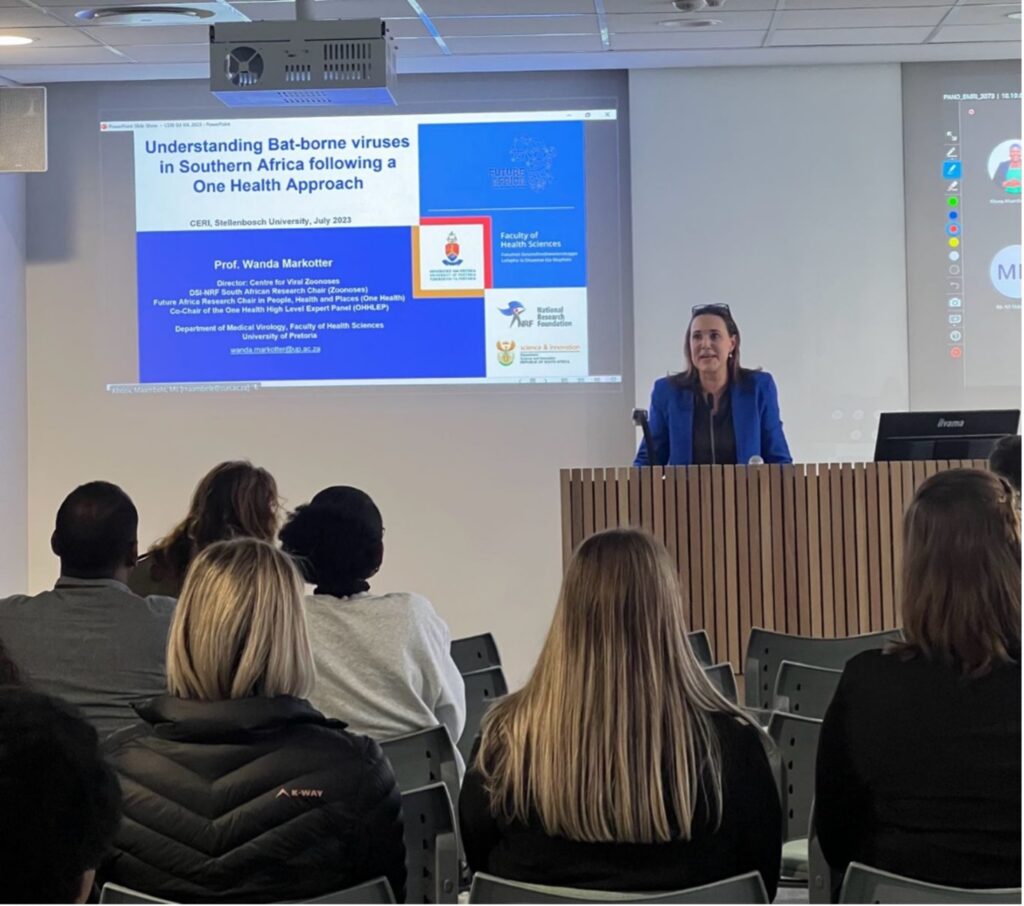The threat of bat-borne viruses in Southern Africa continues to be a major concern for public health and wildlife conservation. In a bid to shed light on this critical issue, the Centre for Epidemic Response and Innovation (CERI) hosted its monthly scientific seminar, featuring esteemed guest speaker Prof. Wanda Markotter, Director of the Centre for Viral Zoonoses at University of Pretoria and a leading expert in zoonotic diseases.
The seminar, titled ‘Understanding Bat-borne viruses in Southern Africa following a One Health Approach,‘ emphasized the importance of taking a holistic and integrated approach to protect the health of both humans and animals. Prof. Markotter, a DSI-NRF South African Research Chair (Zoonoses) and co-chair of the One Health High-Level Expert Panel (OHHLEP), highlighted the significance of investing in prevention strategies rather than just focusing on response and preparedness measures.
The One Health approach recognizes the interconnectedness of various elements in the environment and mobilizes multiple sectors and communities to foster well-being while addressing the collective need for clean water, safe food, and action on climate change.
The urgency for adopting such an approach is evident as zoonotic diseases continue to emerge from animal reservoirs. Mammals, especially bats, rodents, primates, and certain bird species, have been identified as important reservoirs of viruses with pandemic potential. To understand the spillover of diseases, Prof. Markotter stressed the need to look beyond individual species and consider the entire ecosystem.
During the seminar, Prof. Markotter highlighted the global diversity of bat coronaviruses, which have been identified as the source of several emergent coronaviruses in the past two decades. Some of the notable viruses include SARS-CoV, SARS-CoV-2, Middle East Respiratory Syndrome Coronavirus (MERS-CoV), and Swine Acute Diarrhoea Syndrome Coronavirus (SADS-CoV). All of these viruses have been connected to spillover events from bats to new hosts, including humans. Understanding the movement patterns of bats and their interactions with human settlements is crucial in assessing the risk of such spillover events.
The monthly seminars hosted by CERI have proven to be a vital platform for fostering collaboration and knowledge exchange among experts in the field. With a hybrid format, the seminars welcome both physical and virtual attendees, enabling a broader outreach and a more inclusive exchange of ideas.
The study of bat-borne viruses is of paramount importance due to their potential to cause devastating outbreaks. By better understanding these viruses and the dynamics of their transmission, scientists and health authorities can develop effective prevention and control strategies. Moreover, the One Health approach ensures that responses to such public health threats are comprehensive, involving multiple disciplines and stakeholders. This not only helps protect human populations but also contributes to the preservation of biodiversity and ecological balance in the region.
Prof Markotter’s seminar highlighted the significance of continuous research and collaboration in the fight against emerging diseases. By embracing a One Health approach and addressing the complexities of zoonotic diseases at their root, Southern Africa can move closer to achieving a safer and healthier coexistence between humans, animals, and the environment.


